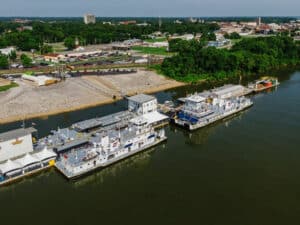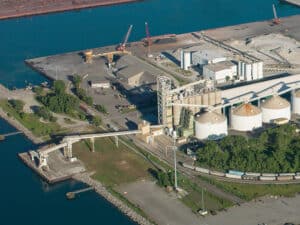
Port of Greater Baton Rouge could be home to $9.2 billion renewable fuel complex
Written by Marine Log Staff
Image: Port of Greater Baton Rouge
Grön Fuels LLC, a portfolio company of Fidelis Infrastructure is studying the feasibility of a renewable fuel complex at the Port of Greater Baton Rouge. With expansions and associated projects, the complex could involve up to $9.2 billion of total investment over several phases. A final investment decision is expected in 2021, which will determine the final cost of the project’s first phase.
Through all phases and associated projects, the complex would create an estimated 1,025 new direct jobs, with an average annual salary of $98,595, plus benefits. Louisiana Economic Development estimates the project and subsequent phases would result in up to 4,560 new indirect jobs, for a total of 5,585 new jobs for the Capital Region.
“This renewable fuel production facility will help to secure Louisiana’s place as a leader in environmentally friendly energy production,” Louisiana Gov. John Bel Edwards said. “Growing global demand for renewable transportation fuels creates a significant growth opportunity for our state.”
The project would be built in stages over nine years at a site leased from the port on the west bank of the Mississippi River, near Port Allen. The first phase of construction would involve a capital investment of over $1.25 billion and create 340 new direct jobs by 2024. The base project is expected to produce up to 60,000 barrels per day of low-carbon renewable diesel, with an option to produce renewable jet fuel utilizing non-fossil feedstocks, including soybean oil, corn oil and animal fats. Upon completion of all phases—potentially by 2030—the site would be one of the largest renewable fuel complexes in the world.
“Louisiana’s core strengths in the field of building and operating plants that produce fuels and products for the world, coupled with its logistically advantaged deepwater location at the nexus of energy and agriculture, serve as the launching point for a new ‘high tech’ transition of the region into the next generation of energy,” Fidelis Managing Partner Dan Shapiro said. “I’m proud to be involved in this exciting project as we work to advance it through feasibility and its next steps.”
Houston-based Fidelis Infrastructure is an asset management firm specializing in specific industry sectors, including renewable energy, low-carbon transportation fuels, sustainable and circular economy infrastructure, and digital infrastructure. The Fidelis team has been involved in complex infrastructure projects ranging from $40 million up to $2 billion, including fiber-optic networks; solar power generation; downstream petrochemical; long-haul, high-voltage electric transmission; and gas pipeline projects. Company co-founders Daniel J. Shapiro and Bengt Jarlsjo both attended Louisiana State University and previously worked for The Shaw Group in Baton Rouge.
“It definitely feels good to work to advance this project and give back to Louisiana and the Baton Rouge region,” Jarlsjo said.
LED began formal project discussions with Fidelis Infrastructure about Grön Fuels in March 2020. To secure the project, the State of Louisiana offered a competitive incentive package—subject to a final investment decision – that includes the comprehensive solutions of the LED FastStart workforce development program for the past 11 years. The package also includes a performance-based grant of up to $15 million, payable at up to $2.5 million per year for six years, for project development and infrastructure. The company also is expected to utilize the state’s Quality Jobs and Industrial Tax Exemption programs.
“The port is excited to have finalized the ground lease and assist Fidelis Infrastructure in advancing the investment in the Grön Fuels new renewable diesel project for Louisiana and the Greater Baton Rouge region,” said Jay Hardman, Executive Director of the Port of Greater Baton Rouge. “The project is great for the people of Louisiana, the port and the community and economic development mission it serves, the agricultural industry, and those who benefit from the clean fuels the plant will produce.”


![Tom Frazier aground and listing to starboard on Feb. 11, 2024. [Photo: U.S. Coast Guard]](https://www.marinelog.com/wp-content/uploads/2025/06/Towboataground-300x225.jpg)

